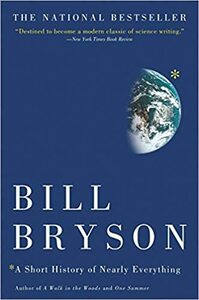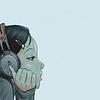Take a photo of a barcode or cover
Bryson's conversational tone and oft-inserted hilarious anecdotes made learning about science interesting even for a policy dolt like myself.
Well, that took only forever like the short history of us did :P. That being said, I was constantly led into corners with information I needed to look up and be awed. Which is why, it’s not a book to be read in a seating. The book demands patience and it needs to be sipped like tea.
Short History of Nearly Everything is just what the title promises, delving into every branch of science and every world—from the microbial to the universe. The information is dense and winding. The author is a little gamer doing every possible side quest and taking you along with it. And sometimes, maybe a little more than sometimes, it’s a really long winding path and a bit frustrating.
There is a lot of information that sometimes felt like it need not be there. We could do with a little less of the information on the personal lives of the scientists, while some seemed to like it. Here is the crazy part— I want to give this book a go again, just not in the near future.
The good part is, the book is accessible to people who don’t have a science background and want to understand the world around us and how it evolved to where it is. Well, we weren’t the result of it, just a happy random accident.
Short History of Nearly Everything is just what the title promises, delving into every branch of science and every world—from the microbial to the universe. The information is dense and winding. The author is a little gamer doing every possible side quest and taking you along with it. And sometimes, maybe a little more than sometimes, it’s a really long winding path and a bit frustrating.
There is a lot of information that sometimes felt like it need not be there. We could do with a little less of the information on the personal lives of the scientists, while some seemed to like it. Here is the crazy part— I want to give this book a go again, just not in the near future.
The good part is, the book is accessible to people who don’t have a science background and want to understand the world around us and how it evolved to where it is. Well, we weren’t the result of it, just a happy random accident.
Everyone must read this book. You must read this book, whoever you are, wherever you live, whatever your beliefs or your views of the world.
Quite simply, a book of the most astonishing facts in our universe told by a master and entertaining story-telling and read by a phenomenal narrator: It was a symphony for the ears and music for the soul to listen to how our universe was born, well what we think we know anyway and that goes for just about everything else: We think we know how quantum physics works or how evolution of apes ended up with us homo sapiens or how big or old the universe really is but honestly, we really know so very little. So very little indeed. And that is the biggest realization as you read or better yet, listen to Bryson's brilliant book read by Richard Matthews.
I studied engineering in college, thanks to my dad's influence, and I don't believe I have ever appreciated science, math, physics, chemistry, biology, astronomy, anthropology, botany, or zoology at all. That has changed. This book has made me more hungry for knowledge than all my years in college or high school ever did. And that alone makes it a magnificent book.
Bryson is entertaining to a fault; if you can weave the deep mysteries of the universe into fascinating stories such as he has done, with the characters varying from atoms or stars in far away galaxies to scientists and mathematicians and physicists who played a role in some major discovery, and if you can then help our feeble human mind expand its understanding of reality by just a little bit, then you have my deepest gratitude and loyalty as a reader and follower and Bryson has done this and so much more with A Short History of Nearly Everything.
You must read this book. Or better yet, pick up the audio from Audible because Richard Matthews is exclusive!
Quite simply, a book of the most astonishing facts in our universe told by a master and entertaining story-telling and read by a phenomenal narrator: It was a symphony for the ears and music for the soul to listen to how our universe was born, well what we think we know anyway and that goes for just about everything else: We think we know how quantum physics works or how evolution of apes ended up with us homo sapiens or how big or old the universe really is but honestly, we really know so very little. So very little indeed. And that is the biggest realization as you read or better yet, listen to Bryson's brilliant book read by Richard Matthews.
I studied engineering in college, thanks to my dad's influence, and I don't believe I have ever appreciated science, math, physics, chemistry, biology, astronomy, anthropology, botany, or zoology at all. That has changed. This book has made me more hungry for knowledge than all my years in college or high school ever did. And that alone makes it a magnificent book.
Bryson is entertaining to a fault; if you can weave the deep mysteries of the universe into fascinating stories such as he has done, with the characters varying from atoms or stars in far away galaxies to scientists and mathematicians and physicists who played a role in some major discovery, and if you can then help our feeble human mind expand its understanding of reality by just a little bit, then you have my deepest gratitude and loyalty as a reader and follower and Bryson has done this and so much more with A Short History of Nearly Everything.
You must read this book. Or better yet, pick up the audio from Audible because Richard Matthews is exclusive!
Could not get through this book. It could not grab or hold my attention.
Nonostante la mia entusiastica recensione alla 150ma pagina, devo dire che un po' svacca verso i 3/4.
Non mi puoi fare un intero capitolo sui licheni che ok, sono carini e decorativi, ma stufacchiano pure un bel po! :D
L'ho trovato un bel libro, meritevole di 4 stelline. Mi ha incuriosito moltissimo e mi ha fatto cercare su Google un'infinità di cose. Mi è piaciuta anche la scelta di descrivere pregi e difetti dei vari personaggi citati. Li ha resi più umani e meno inarrivabili.
Non mi puoi fare un intero capitolo sui licheni che ok, sono carini e decorativi, ma stufacchiano pure un bel po! :D
L'ho trovato un bel libro, meritevole di 4 stelline. Mi ha incuriosito moltissimo e mi ha fatto cercare su Google un'infinità di cose. Mi è piaciuta anche la scelta di descrivere pregi e difetti dei vari personaggi citati. Li ha resi più umani e meno inarrivabili.
informative
slow-paced
If you only read one popular science book then this might have to be the one. As with all good popular science, it's heavy on the anecdotes and light on the scientific detail. Makes me want to subscribe to Nature.
This is a book for a novice in the sciences, and I think it does a pretty good job in that capacity while managing also to be entertaining. However, as a person with a fairly strong background in earth and life sciences, I found myself getting impatient with a lot of the book- like sitting through a joke when you already know the punchline. Other sections- the ones that dealt with cosmology, quantum physics and subatomic particles- were completely incomprehensible-- not because Bryson failed as a journalist but because the concepts themselves are beyond most people. I almost wonder why he bothered to include this material. I had some misgivings about the imprecision of his language in places (eg something like "life wants to continue" would be much more accurately expressed as "life has a strong tendency to continue") that a layman may or may not pick up on. I did, however, enjoy the biographical material on scientists and discoverers.
adventurous
challenging
funny
informative
reflective
slow-paced






